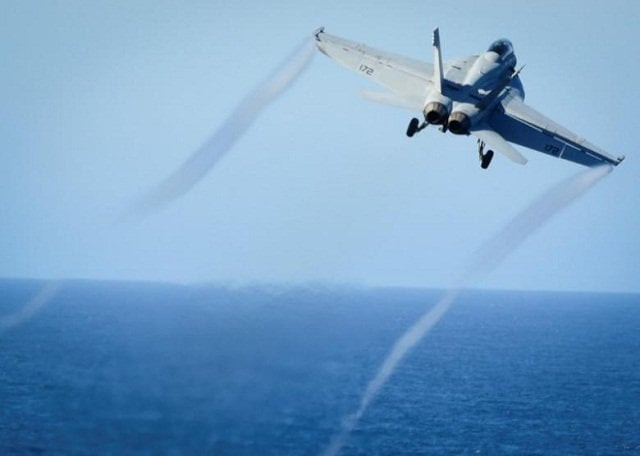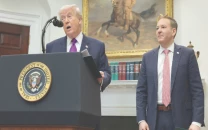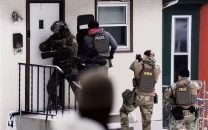America's widening role in Syria's civil war
Unprecedented US downing of a Syrian regime warplane highlights the rapidly shifting dynamic in the six-year conflict

An F/A-18E Super Hornet takes off from the flight deck of a U.S. Navy aircraft carrier. PHOTO: REUTERS
The United States insisted on Monday it wants no broader role in Syria's civil war, and seeks only to destroy the Islamic State group, but the weekend incident shows the limits of America's ability to stay disengaged.
Trump administration open to more strikes on Syria
With myriad competing forces quickly converging in Syria, and new powers delegated to Trump's commanders, the risk of additional confrontation is real.
An American F/A-18E Super Hornet shot down a Syrian SU-22 on Sunday evening as it "dropped bombs" near a US-backed alliance called the Syrian Democratic Forces, who are fighting Islamic State, the US-led coalition said in a statement. The Syrian warplane was shot down "in accordance with rules of engagement and in collective self-defense of coalition partnered forces," the statement said.
Syria's army has disputed this account, saying its plane was hit while conducting a mission against IS. A US official told AFP the pilot of the Syrian plane appeared to have ejected before the jet was hit, though his fate was unknown.
The shoot-down marks the first time a US jet has downed a Syrian regime warplane, despite leading a massive air campaign targeting IS in Syria for nearly three years.
Russia, which is flying its own air war in Syria to prop up President Bashar al-Assad, condemned the incident and said it had shut off a special 'deconfliction' hotline with the US military, though top officer General Joe Dunford later said the United States was seeking to re-establish the channel.
US launches missiles at Assad's airbase in Syria
Sunday's incident marks the latest in a series of US attacks on pro-regime forces. On April 7, Trump authorised a cruise missile strike against a Syrian air base in response to a suspected chemical weapons attack by the regime against civilians. Then on May 18, coalition aircraft struck a pro-regime convoy apparently transporting Shia militiamen as it drove toward a coalition garrison at At-Tanaf near the Jordanian border.
A similar incident occurred on June 6, and on June 8, a US warplane shot down a pro-regime drone in Syria after it fired at coalition forces. The Pentagon has repeatedly stressed it has no interest in increasing its role in Syria's civil war, and that its sole focus is on defeating IS.
What the recent incidents "indicate is a complicated and complex battle-space, and we continue to try to operate transparently and to communicate intentions around our actions so it is clear we are focusing on the defeat of IS in Syria," US Central Command spokesperson Colonel John Thomas said on Monday.
Officials emphasise the strikes were all conducted in self-defense after pro-regime forces ignored warnings. But the incidents also highlight the changing dynamics of the Syrian civil war, and observers say further confrontations are likely.
"The US mission in Syria is dangerously morphing from a counter-terrorism action against the Islamic State into a party to Syria's civil war," said Bill Roggio, a senior fellow at the Foundation for Defense of Democracies and editor of its Long War Journal.
Until recently, pro-regime forces were focused on fighting rebels in western Syria but victories in Aleppo and elsewhere have freed them up to move east, pushing them into contact with the SDF. Many analysts see Iran's hand behind this push, and highlight Tehran's concerns over the growing strength and influence of the SDF.
Trump orders strikes on Assad airbase
Charles Lister, a senior fellow at the Middle East Institute, sees the unfolding situation in Syria as an inevitable consequence of America's stubborn insistence that it is only in the country to fight IS, without addressing the broader civil war.
"We cannot only fight IS effectively - we are going to come into conflict with others. We have to more clearly define what our position is," he said.
Trump, who campaigned on a pledge to quickly defeat IS, ordered his generals to come up with a revised plan to defeat the militant group. The review resulted in an "annihilation campaign" aimed at killing all IS fighters, and saw commanders gain greater autonomy to make battlefield decisions and approve strikes.
Thomas said the new powers would not have played any role in the recent decisions to attack pro-regime forces, as these were all ordered in self-defense.


















COMMENTS
Comments are moderated and generally will be posted if they are on-topic and not abusive.
For more information, please see our Comments FAQ